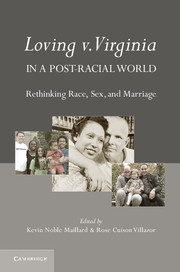Description
Loving v. Virginia in a Post-Racial World
Rethinking Race, Sex, and Marriage
Coordinators: Noble Maillard Kevin, Cuison Villazor Rose
This book takes a critical approach to the US Supreme Court ruling in Loving v. Virginia.
Language: English
Subject for Loving v. Virginia in a Post-Racial World:
Loving vs virginia in a post-racial world: rethinking race, sex, and marriage
Publication date: 06-2012
288 p. · 15.5x23.1 cm · Hardback
Publication date: 06-2012
288 p. · 15.5x23.1 cm · Hardback
Loving vs virginia in a post-racial world: rethinking race, sex, and marriage
Publication date: 06-2012
288 p. · 15.1x22.9 cm · Paperback
Publication date: 06-2012
288 p. · 15.1x22.9 cm · Paperback
Description
/li>Contents
/li>Biography
/li>
In 1967, the US Supreme Court ruled that laws prohibiting interracial marriage were unconstitutional in Loving v. Virginia. Although this case promotes marital freedom and racial equality, there are still significant legal and social barriers to the free formation of intimate relationships. Marriage continues to be the sole measure of commitment, mixed relationships continue to be rare, and same-sex marriage is only legal in 6 out of 50 states. Most discussion of Loving celebrates the symbolic dismantling of marital discrimination. This book, however, takes a more critical approach to ask how Loving has influenced the 'loving' of America. How far have we come since then and what effect did the case have on individual lives?
Introduction Kevin Noble Maillard and Rose Cuison Villazor; Part I. Explaining Loving vs. Virginia: 1. The legacy of Loving John DeWitt Gregory and Joanna L. Grossman; Part II. Historical Antecedents to Loving: 2. The 'love' of Loving Jason A. Gillmer; 3. Loving in Indian territory: tribal miscegenation law in historical perspective Carla Pratt; 4. American mestizo: Filipinos and antimiscegenation laws in California Leti Volpp; 5. Perez vs. Sharp and the limits of Loving: race, marriage, and citizenship reconsidered R. A. Lenhardt; Part III. Loving and Interracial Relationships: Contemporary Challenges: 6. The road to Loving: the legacy of antimiscegenation law Kevin Noble Maillard; 7. Love at the margins: the racialization of sex and the sexualization of race Camille A. Nelson; 8. The crime of Loving: Loving, Lawrence, and beyond I. Bennett Capers; 9. What's Loving got to do with it? Law shaping experience and experience shaping law Renée M. Landers; 10. Fear of a 'Brown' planet or a new hybrid culture? Jacquelyn Bridgeman; Part IV. Considering the Limits of Loving: 11. Black pluralism in post-Loving America Taunya Lovell Banks; 12. Political blackness: a sociopolitical construction Angelique Davis; 13. Finding a Loving home Angela Onwuachi-Willig and Jacob Willig-Onwuachi; Part V. Loving outside the United States Borders: 14. Racially inadmissible wives Rose Cuison Villazor; 15. Flying buttresses Nancy K. Ota; 16. Crossing borders: Loving vs. Virginia as a story of migration Victor Romero; Part VI. Loving and Beyond: Marriage, Intimacy and Diverse Relationships: 17. Black vs. gay: centering LBGT people of color in civil marriage debates Adele Morrison; 18. Forty years after Loving: a legacy of unintended consequences Rachel F. Moran; 19. The end of marriage Tucker Culbertson; 20. Afterword Peter Wallenstein.
Kevin Noble Maillard is an Associate Professor of Law at Syracuse University where he teaches family law, trusts and estates and on the subjects of children and the law, adoption, and popular culture and the law. He has written about and lectured on nontraditional families, racial intermixture, the role of marriage in America, civil liberties within the family, and popular culture and the law. His work has been published in the New York Times, Cardozo Law Review, SMU Law Review, Fordham Law Review and Law and Inequality. He is a frequent presenter at legal and interdisciplinary conferences.
Rose Cuison Villazor is an Associate Professor of Law at Hofstra Law School. She teaches and writes in the areas of race, citizenship, property and immigration law. Her articles have appeared in the New York University Law Review, California Law Review, Washington University Law Review and Southern California Law Review. In 2011, she received the AALS Minority Section Derrick A. Bell, Jr Award, which is given to a junior faculty member who, through activism, mentoring, teaching and scholarship, has made an extraordinary contribution to legal education, the legal system or social justice.
Rose Cuison Villazor is an Associate Professor of Law at Hofstra Law School. She teaches and writes in the areas of race, citizenship, property and immigration law. Her articles have appeared in the New York University Law Review, California Law Review, Washington University Law Review and Southern California Law Review. In 2011, she received the AALS Minority Section Derrick A. Bell, Jr Award, which is given to a junior faculty member who, through activism, mentoring, teaching and scholarship, has made an extraordinary contribution to legal education, the legal system or social justice.
© 2024 LAVOISIER S.A.S.

